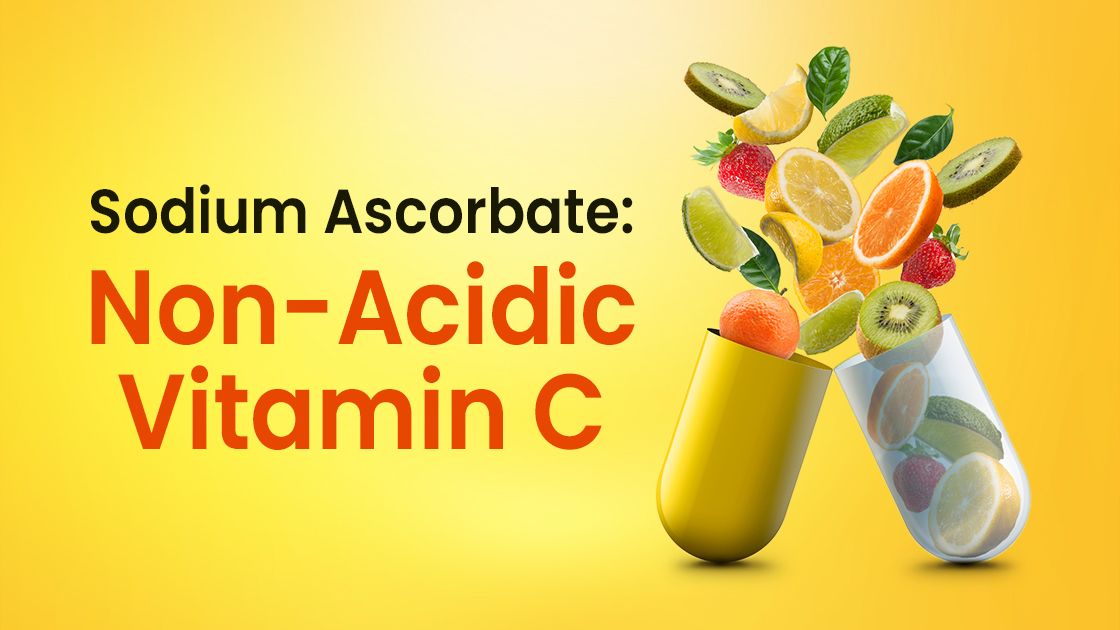Sodium Ascorbate: The Benefits of a Non-Acidic Vitamin C
What is Vitamin C?
Vitamin C is a widely used water-soluble vitamin known to play a vital role as in a variety of body functions. It is one of the essential nutrients needed for building and strengthening body tissues owing to its action in the formation of a firm collagen, the cement-like substance that binds the body cells together to form strong tissues. It is therefore important in the formation of healthy skin, blood vessel walls, cartilage, strong bones and teeth, as well as in promoting faster healing of wounds.
Being touted as the body’s “prime” immune system boosting nutrient, vitamin C is popularly known for its protective function against stress and certain diseases such as anemia, immune system deficiencies, asthma, viral infections and cardiovascular illnesses.
Vitamin C is also reported to promote cardiovascular health and helps lower blood cholesterol.
As a potent antioxidant, Vitamin C strengthens the immune system and increases body resistance to stress and infections. Specifically, Vitamin C protects the body’s soldiers, the white blood cells, from the damaging effects of free radicals with its antioxidative properties. Vitamin C stimulates the white blood cells in clearing away infectious microbes.
Though Vitamin C does not offer a cure for diseases such as the common cold, several studies suggest that vitamin C helps in alleviating the disturbing symptoms of cold and in shortening its duration. This can reduce the risk for dreaded lung infections such as pneumonia.
Ascorbic acid and Sodium ascorbate, are they the same?
Many are quite reluctant in taking ascorbic acid or the so- called ordinary or “acidic” Vitamin C because of its potential effect in irritating the lining of the stomach of susceptible individuals. Thus, vitamin C is buffered or neutralized with the mineral sodium as the salt of vitamin C to become sodium ascorbate. Labelled as the non-acidic vitamin C, sodium ascorbate is in alkaline or buffered form, therefore it will cause less stomach irritation as compared with ascorbic acid.
Sodium ascorbate delivers the same benefits of vitamin C to the human body without causing the possible gastric irritating effects of ascorbic acid.
Since sodium ascorbate is less likely associated with hyperacidity, it is commonly recommended to individuals who experience gastrointestinal complaints such as heartburn, flatulence, nausea and diarrhea.
How safe is Vitamin C?
Despite its sodium content, Sodium ascorbate in recommended doses is safe for hypertensive individuals. Adults, especially those with cardiovascular disease, on a low-salt diet are advised to limit their total daily sodium intake to less than 1,500 mg/day.
Sodium ascorbate contains only 10% – 11% sodium. Approximately, 1000 mg of sodium ascorbate, equivalent to two 500mg capsules, provides 889 mg of vitamin C and only 111 mg of sodium. 1-2 capsule(s) of 500 mg of sodium ascorbate taken daily will only give approximately 111 mg sodium.
Vitamin C is usually well tolerated and generally no adverse reactions are expected when it is taken at recommended doses. Vitamin C may cause diarrhea if taken in large amounts.
Vitamin C should be given with caution in patients with hyperoxaluria because large amounts may lead to the formation of calcium oxalate stones in the kidney. Urinary stone formers appear to be at higher risk for calculi if individuals take large doses of vitamin C daily.
Large doses of vitamin C may also result in a false positive glucose test in the urine and may interfere with the diagnosis of diabetes mellitus.
References:
Vitamin C. Oregon State University Linus Pauling Institute Micronutrient Information Center.
Gombart AF, Pierre A, Maggini S. A Review of Micronutrients and the Immune System-Working in Harmony to Reduce the Risk of Infection. Immune Defense, Vitamin C, Vitamins
